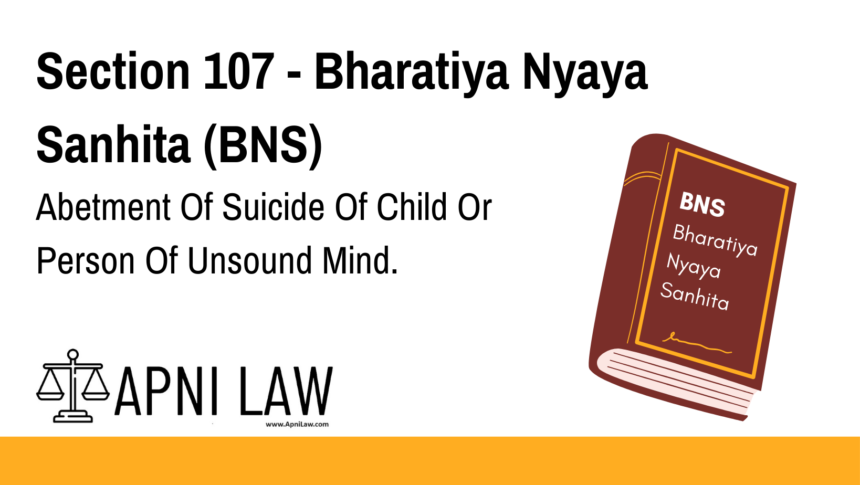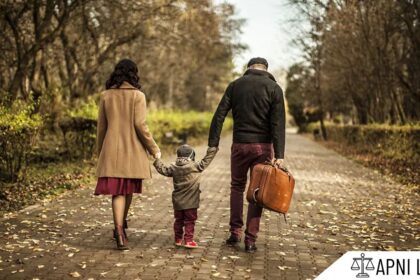Code
If any child, any person of unsound mind, any delirious person or any person in
a state of intoxication, commits suicide, whoever abets the commission of such suicide, shall
be punished with death or imprisonment for life, or imprisonment for a term not exceeding ten years, and shall also be liable to fine.
Explanation of Section 107 BNS
Section 107 of the Bharatiya Nyaya Sanhita (BNS), 2023, deals with cases where a person aids, provokes, or encourages the suicide of vulnerable individuals such as:
- Children (minors below 18 years)
- Persons of unsound mind (e.g., mentally ill individuals)
- Delirious persons (e.g., severely ill individuals experiencing confusion)
- Persons under intoxication (e.g., heavily drunk or drugged individuals)
Since these individuals may not have full control over their actions, the abetter is held severely liable.
Key Elements of Section 107 BNS:
- Victim’s Vulnerability: The victim must be:
- A child (below 18 years of age).
- A person of unsound mind (mentally unstable).
- A delirious person (temporary loss of reasoning due to illness).
- A person intoxicated by alcohol or drugs.
- Act of Abetment:
- Encouraging or forcing suicide.
- Providing means (e.g., poison, weapon, or other assistance).
- Mentally harassing or manipulating the victim.
- Punishment:
- Death penalty or
- Life imprisonment or
- Imprisonment up to 10 years and
- Liable to fine
Illustrations
Example 1: Suicide of a Minor Due to Harassment
A teacher or parent constantly humiliates, beats, or mentally tortures a child, leading the child to commit suicide.
- The teacher or parent may be punished with life imprisonment or even the death penalty under Section 107 BNS.
Example 2: Encouraging a Mentally Unstable Person to Die
A caregiver looking after a mentally ill person pressures or provokes them to take their own life.
- The caregiver is guilty under Section 107 BNS.
Example 3: Suicide Due to Forced Intoxication
A group of people force an intoxicated person into consuming excessive alcohol or drugs, pushing them to suicide.
- This amounts to abetment, and the accused can face death or life imprisonment.
Common Questions and Answers on Section 107 BNS
1. How is Section 107 different from normal abetment of suicide (Section 109 BNS)?
- Section 107 BNS applies when the victim is vulnerable (a child, mentally ill, or intoxicated).
- Section 109 BNS applies to general cases where suicide is abetted, without the victim falling under these categories.
2. Is Section 107 BNS a bailable offense?
No, abetment of suicide of a vulnerable person is a non-bailable and serious offense, punishable with life imprisonment or death.
3. What if a person unintentionally influences a vulnerable person to commit suicide?
The law requires clear intent and active participation in abetment. If the accused had no intention or involvement, they may not be held liable.
4. What are some real-life cases where Section 107 applies?
- Cyberbullying cases leading to child suicides.
- Mental harassment by family members causing a mentally ill person to take their life.
- Caregivers or institutions mistreating and mentally breaking down disabled persons.
5. Can a person convicted under Section 107 BNS get a lighter sentence?
Yes, if mitigating factors exist, such as lack of direct intent or coercion, courts may impose a lesser sentence (imprisonment up to 10 years) instead of life imprisonment or death penalty.
Conclusion
Section 107 BNS ensures strict punishment for those who encourage, harass, or assist in the suicide of vulnerable individuals. It is a crucial law for protecting minors, mentally unstable individuals, and intoxicated persons from external influence leading to suicide.
For legal help, visit ApniLaw today! 🚀








